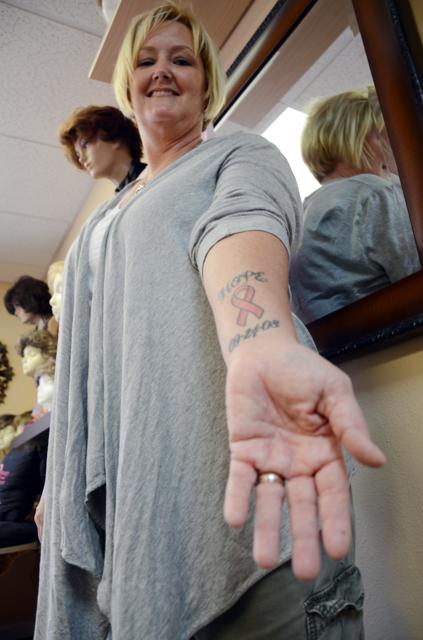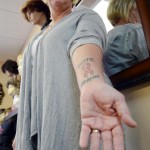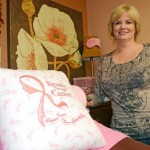- Think pink: A few weeks after her final round of chemotherapy, breast-cancer survivor Leisa Wilson got a pink ribbon tattooed on her forearm with the date of her diagnosis and the word hope. "I tell everybody this is hope that it will never come back and that none of your friends will get it," she says. Photo by Caitlin Byrd
- Pretty in pink: Earleen Bennett, founder of the nonprofit Beauty Through Cancer, shows off the room where she gives breast-cancer survivors free areola pigmentation tattoos. She says the tattoo makes them feel like a woman again. Photo by Caitlin Byrd
Leisa Wilson still remembers when her blond hair would fall out in chunks on the bathroom floor each morning, followed by a stream of her tears. And when she let her eyes wander down past her face, she’d see the rise of her right breast, but not her left — she’d had a mastectomy to excise a 1.1 centimeter tumor.
That was three years ago, but Wilson hasn’t forgotten how it feels to have your face look familiar while the rest of your body seems like a stranger’s.
“Your breast is gone on that side: There’s a terrible scar there. You have no hair, you lose your eyebrows, you lose your eyelashes. I even lost some of my fingernails,” Wilson recalls. “You just don’t feel attractive. You know it’s temporary, but I guess with women, you feel like you look hideous.”
Roughly one in eight American women will develop invasive breast cancer during her lifetime, according to the National Cancer Institute. And about 82 percent of them experience changes in their appearance due to chemotherapy and radiation treatments, American Cancer Society statistics show.
A close shave
To prepare for those changes, Wilson had her blond locks cut progressively shorter during the run-up to chemotherapy. But once her hair began falling out, she resorted to more drastic measures.
“I got tired of crying in front of the mirror every morning,” she explains. “So one day I called my son and let him and my husband shave my head. My husband shaved one side and my son shaved the other, and that really helped lift this huge stress off my shoulders.”
Despite the strong moral support from her family, however, Wilson says she needed something else to help her feel more like the woman she was before being diagnosed with breast cancer. She didn’t want to have to create more code words so friends could alert her when something was amiss (such as “mistletoe” for when her wig shifted while she was Christmas shopping). She didn’t want to wear a hat and have women come up and tell her they knew what she was going through. She just wanted to get a bit of confidence and balance back into her life via something she could control: her appearance.
So Wilson signed up for the American Cancer Society’s “Look Good…Feel Better” workshop, which teaches women with cancer special makeup and style tips for use during treatment. There she met Earleen Bennett, who founded Beauty Through Cancer nearly three years ago. Whether it’s giving a woman a free wig or showing her how to wrap a headscarf, Bennett says her goal is to make every woman feel complete — and beautiful. But Bennett offers more than free wigs to the women who walk through her doors.
As a licensed permanent-makeup artist, she provides free areola-pigmentation tattoos to women who’ve had breast-reconstruction surgery due to cancer. The reconstructed breasts have no nipples, leaving some women feeling like Barbie dolls, notes Bennett; the tattoos make them look more natural.
“A woman gets out of the shower, and her breasts are the first thing she sees: She looks down, and they’re there,” Bennett explains. “You watch them grow when you’re a child, and you nurse your children with them when you’re a mother. They are part of you, and to watch them disappear off your body changes you.”
Women on a journey
The Asheville-based nonprofit also hosts a monthly support group, because the impact of cancer transcends the purely physical. “It affects your self-esteem, your self-worth, your relationships with your husband if you are married, your partner, whatever,” she says.
For Wilson, the discomfort with her own body proved more painful than any surgery. “As far as having the mastectomy done and that pain, it wasn’t a big deal to me. But it was afterwards, and having to look at myself, that’s when it hurt. I didn’t even want my husband to see me,” she recalls.
Bennett says she hears this a lot. “Doctors tend to tell women, ‘You’re going to get through this: Your hair will grow back; your eyebrows will grow back. The treatment is doing this to you, but that means it’s working.’ But that doesn’t help you when you’re standing in front of the mirror,” she explains. “Living in the moment is what people do with cancer: It’s all they have. So when they look in the mirror and who they see looking back at them isn’t them, it’s a huge thing.”
Those moments do pass, however, notes Bennett. “You’re not cancer: You’re a woman going through a journey.”
A few weeks after finishing her last round of chemotherapy, Wilson decided to honor that journey with a special tattoo on her forearm. Beneath a pink ribbon is the date she was diagnosed with breast cancer; above it is a single word: “hope.”
“I tell everybody, ‘This is hope that it will never come back and that none of your friends will get it,’” Wilson reveals. “This is hope for a cure that can hopefully figure out why it’s happening, and maybe do something to keep it from happening.”
— UNCA senior Caitlin Byrd is new-media editor for The Blue Banner, the campus paper.








My name is Maria and I am Leisa Wilson’s oldest sister of 3. To see my baby sister have to endure this terrible time in her life was heartbreaking to us all. But it also showed me just exactly how strong my sister is and it made me stop and realize how much I love her and what she means to me. I am so thankful that she has beaten this demon and I pray that it NEVER comes back and that it never affects our family again. I have 2 daughters of my own and I hope they never have to go through what I saw Leisa go through. There has to be a cure somewhere! Everyone please continue to support the cause.
Maria, it was an absolute pleasure to speak to your sister. I hope that this article was able to show people who read it just how beautiful and strong women like your Leisa are, despite how ugly this disease can be.